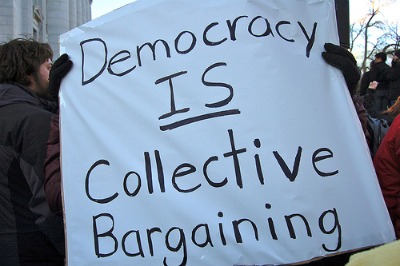
Multi-billionaire corporate magnates Charles and David Koch, major behind-the-scenes players in the dispute between Wisconsin public employees and Republican Gov. Scott Walker, stand to gain more than meets the eye from this epic battle.
Buried deep inside Walker’s 144-page contested budget bill are 10 lines, unrelated to employee takeaways or union rights, which would allow the state to sell to or contract with a private corporation any state-owned heating, cooling and power plant, “with or without the solicitation of bids,” Milwaukee’s TMJ-4 television news reports.
The no-bids option could mean sweet deals for the ultra-right Koch brothers, who are major business and political players in the state, and who gave generously to Walker’s 2010 gubernatorial win.
“They put all this money into getting him elected and now they are reaping the benefit,” One Wisconsin Now director Scot Ross said, “whether it’s reducing the rights of working families in Wisconsin as well as this payoff on the power plants.”
Koch Industries, a private energy conglomerate with subsidiaries in manufacturing, trading and investments, has extensive holdings in Wisconsin.
The second largest donation to Walker’s campaign, $43,000, came from Koch Industries PAC. It was slightly less than the combined contributions of a number of housing and realtor groups in Wisconsin, according to state finance filings.
In addition, Koch Industries PAC gave $1 million to the Republican Governors Association, out of which $65,000 was spent on independent expenditures to support Walker. With the help of Koch’s PAC, the RGA also spent $3.4 million on TV ads and mailers attacking Walker’s opponent, Milwaukee Mayor Tom Barrett.
“Really,” University of Wisconsin-Milwaukee Public Administration Professor Mordecai Lee told TMJ-4, “it seems to me it makes government look like it’s for sale.”
The Koch brothers are involved up to their eyeballs in the current struggle over union rights in Wisconsin.
The brothers founded and help finance Americans for Prosperity, a Virginia-based far-right “astroturf” group that is orchestrating the current actions of Walker supporters on the ground. The group’s budget jumped from $7 million three years ago to $40 million in 2010.
Tim Phillips, AFP’s president, revealed in a New York Times interview that executives with the Koch-backed group worked behind the scenes to encourage a union showdown, even before the new Republican governor was sworn in last month.
Phillips also said that AFP is working with state officials and right-wing activists in Indiana, Ohio and Pennsylvania to curtail public employee benefits or union rights.
The Koch-backed group has been bussing supporters into Wisconsin to counter the massive union-led protests.
“We are going to bring fiscal sanity back to this great nation,” Phillips told counter-protesters.
In a sign that the battle to win public opinion will escalate, AFP spokesperson Mary Ellen Burke told the Washington Post Monday, “We’re planning to run TV and radio ads tomorrow, as well as host a few events across the state later this week.”
Meanwhile, the union-led actions are also being ratcheted up as unions stage solidarity actions across the country and hit the state’s airwaves with ads pummeling Gov. Walker for refusing to drop his assault on public employee bargaining rights.
Launched by the national and state AFL-CIO, in coordination with unions representing public employees, one TV ad features Racine firefighter Mike DeGarmo.
In an obvious rebuke to Walker’s effort to divide public workers by exempting firefighters and police from his proposal, the Racine firefighter states, “We stand together, or we fall together.” He called on “the people of Wisconsin to stand with us.”
During a demonstration outside the Wisconsin Capitol recently, a protester’s sign declared wryly, “Gov. Walker: Kick the Koch Habit.” (Koch is pronounced Coke).
Juan Lopez is a vice chair of the CPUSA.
Click here for the story on Koch Oil stealing $31 million worth of oil from Indian tribes in Oklahoma.
- Tags:
- ultra-right
- Wisconsin


 Join Now
Join Now